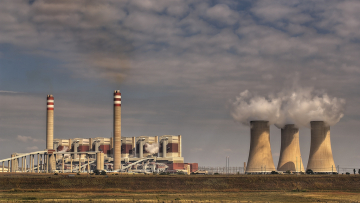U.S. Taxpayer-Funded Bank Should Follow the Doctor's Orders on Coal in South Africa
Any day now, the United States' export credit agency, the U.S. Export-Import Bank (Ex-Im), is expected to decide on whether or not it will help finance the construction of one of the world's largest coal plants. Located in South Africa, the 4800 MW behemoth, known as Kusile, would be the size of about 10 typical coal plants in the US. On top of the tens of millions of tons of climate polluting gases it would spew out every year, Kusile would create a public health nightmare for poor South Africans living in already overly polluted areas. That explains why Dr. Paul Epstein of the Center for Health and the Global Environment at Harvard Medical School has weighed in.
Dr. Epstein knows the true costs of coal. He is the lead author of a new
study published in the Annals of the New York Academy of Sciences: "Full Cost Accounting for the Life Cycle of Coal."
Earlier this month, Dr. Epstein wrote to Ex-Im,
"Based on the conclusions of our study, we believe that all hidden costs in the life cycle of coal must be included in deliberations concerning investments in new coal based projects. I strongly urge the US Ex‐Im Bank to make a decision based on the consideration of the full costs of coal to society when considering project financing for the Kusile project."
As Dr. Epstein writes, financing coal is far more expensive and far more damaging to our health than current coal prices would suggest.
"In the study, I along with 11 colleagues, quantify the hidden human health and environmental impacts of coal, from mining to transport and combustion in coal power plants, and the air and water waste stream that accompanies these life cycle stages. We concluded that, in the United States (with a focus on Appalachia) that the life cycle effects of coal cost the U.S. public a third to over one‐half trillion dollars annually."
South African activists know this all too well. As I wrote on The Huffington Post last month, they have been pressing Ex-Im not to finance Kusile. Climate change arguments aside, they've argued forcefully that Kusile would have devastating health and financial consequences for South Africa's people. Instead, Kusile would be a boon for large multinational corporations that receive some of the world's cheapest electricity; these corporations' profits leave South Africa while their pollution remains.
Like Dr. Epstein and South African human rights and environment defenders, groups in the US deeply question Ex-Im's potential involvement in this boondoggle. As a US taxpayer-backed institution, Ex-Im must live up to its own policies to reduce greenhouse gas emissions as well as to congressional mandates to increase support for renewable energy. If its board of directors votes to finance Kusile, Ex-Im's fossil fuel binge will worsen and any chance of Ex-Im meeting Congress's direction that 10 percent of financing go to environmentally beneficial exports will be lost.
But it's not too late. Ex-Im could do the right thing -- both morally and economically. The board of directors can -- and should - decide not to finance Kusile. I urge you to weigh in with them.


